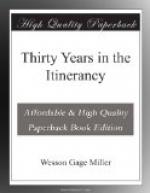But in some cases even a fair and unequivocal vote was not enough. Committees were self-constituted, or perhaps caucus-constituted to interview candidates, much after the modern style, to see whether they were sound on the main question. And as I had now become sufficiently advanced in years to be considered a candidate, I was waited on by such an inquisitorial body. I told the good brethren that I was not a little surprised to find any one in doubt as to my position. “Oh,” said they, “we are not really in doubt as to your position, but we would like to understand how strong your convictions are, as you have not attended our meetings.” “Yes,” said I, “and perhaps you will say that by neglecting your meetings, I have shown a want of zeal for the cause. If so, I wish to state my position. In the first place, I have never felt it to be my duty to make a great show of valor, as long as the enemy is out of reach. And in the second place, I am in a different position from many of our present abolitionists, and should bear myself accordingly. They are young converts, and having just come into the kingdom, they must get up a tremendous shout, so as to satisfy their new associates that their conversion is genuine. But as to myself, I was always an abolitionist. I have never uttered a word, written a sentence, or cast a vote that did not look in that direction. Why, then, should I go into a spasm on the eve of an election?” Whether my little speech had anything to do with the result of the ballot which placed me at the head of the delegation or not, it is impossible to divine. But of one thing I felt assured. I had “freed my mind,” as the old lady said, and felt better. The balance of the delegation were I.M. Leihy, S. C. Thomas, E. Cooke, and P. S. Bennett. At this Conference, I was also appointed the Chairman of a Committee “To Collect Historical Facts.” Thus early did the Conference indicate a desire that the record of her devoted and pioneer men should not be lost.
Whitewater, the seat of the Conference, was a thriving village of two or three thousand inhabitants, and gave the Conference a most hospitable entertainment. This place was settled April 1st, 1837, by Mr. William Barren, who was joined by Mr. Calvin Prince in the middle of the same month.
The first sermon was preached in the fall of the same year by Rev. Jesse Halstead. Whitewater became a separate charge in 1843, with Rev. Alpha Warren as Pastor. During this year a class was formed. The members were: J.K. Wood, Leader; Mrs. J.K. Wood, Henry Johnson, A.R. Eaton, Mrs. A.R. Eaton, Mrs. Dr. Clark, Mrs. J.J. Stearin, Roxana Hamilton, and Miss Whitcomb. The meetings were held in private houses until the new brick school house was built. They were then held in the school house until the Church was erected. The first Church was commenced under the Pastorate of Rev. J. Harrington in 1849, and was completed under that of Rev. J.M. Walker in 1852. It was dedicated by the last named, Feb. 5th, 1852. The Church was enlarged under the Pastorate of Rev. A.C. Huntley.




